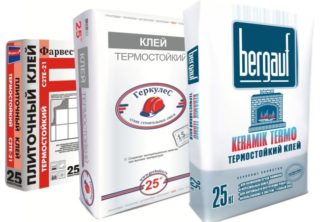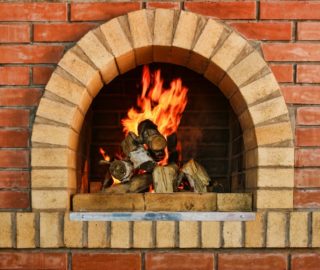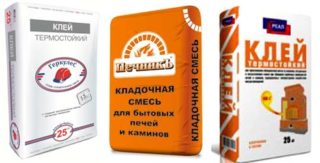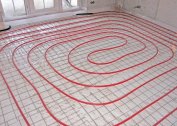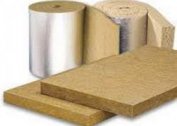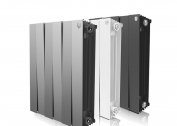In the manufacture and decoration of fireplaces and stoves, the use of typical cement compositions for adhesion of individual masonry elements is unacceptable. This is due to the special operating conditions of structures that are constantly in contact with a high-temperature medium. For these purposes, a special heat-resistant adhesive for stoves and fireplaces is used, durable and elastic at the same time. Such requirements are explained by the fact that when heated, all components increase in size, and when cooled, they return to their previous form. When using heat-resistant plastic components, as a result of these changes, deformation shifts, cracks do not appear and even the smallest fractures are not observed.
Varieties of glue for stoves and fireplaces
Heat-resistant adhesives are classified according to their purpose and features of application in various operating conditions. In accordance with the second indicator, they are divided into the following types:
- thermoplastic compounds;
- thermoset adhesives;
- quick-drying and heat-resistant mixtures.
The first two names have good plastic and inert properties, allowing them to be used for masonry home fireplaces and stoves. The third type of adhesive compositions is designed specifically for use in conditions of sharp temperature fluctuations, within which they retain the declared characteristics.
According to their purpose, heat-resistant adhesives for furnaces are divided into the following two types:
- compositions for finishing the external and front walls of fireplaces and stoves (portals);
- mixtures for laying bases of brick or stone.
When working with these compounds, you must adhere to the recommendations given in the instructions applied to the adhesive packaging.
Heat Resistant Adhesive Components
Manufacturers are trying to make furnace glue as versatile as possible, having improved its following qualities:
- heat resistance and moisture resistance;
- ductility and ability to heat output;
- linear expansion coefficient.
- ecological cleanliness.
To achieve all these indicators, synthetic additives with the predominance of one or more components are added to the glue.
Compounds that meet all the criteria are classified as universal. They include such well-known: Terracotta, Profix, Scanmix Fire, which have a higher cost.
The following mandatory components are distinguished in adhesive mixtures:
- cement used as a binder;
- well cleaned sand;
- fireclay fibers providing the required heat resistance;
- various types of mineral additives and synthetic components.
The latter are used as plasticizers, giving the adhesive composition the desired plasticity. Together with sand, these substances are fillers, allowing to achieve the desired consistency of the solution. Cement gives the heat-resistant adhesive for tiles on the stove the required strength, and synthetic additives provide the necessary moisture resistance, heat transfer and coefficient of linear expansion. The predominance of one of the components changes the properties in the direction of a particular characteristic, reducing the manifestation of all the others.
Required Features
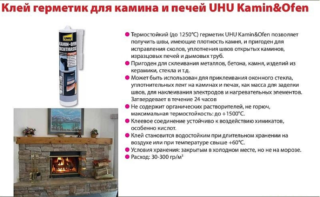 Heat-resistant adhesive is available in the form of a solid or liquid suspension, which includes epoxy resins and a filler (metal powder). The first of them is a binder, cementing components and giving strength to the entire structure.In addition, modifying additives as well as plasticizers are added to the adhesive mixture. Sulfur and other components are included there, giving the composition the desired texture and determining the setting time.
Heat-resistant adhesive is available in the form of a solid or liquid suspension, which includes epoxy resins and a filler (metal powder). The first of them is a binder, cementing components and giving strength to the entire structure.In addition, modifying additives as well as plasticizers are added to the adhesive mixture. Sulfur and other components are included there, giving the composition the desired texture and determining the setting time.
On sale there are natural and synthetic adhesives. Both types are used in the assembly of the bases of fireplaces and home stoves, as well as their decoration and differ only in cost. The liquid version of the adhesive mixture takes a long time to prepare, dries quickly when applied, which complicates all laying procedures. The mixture, produced in dry form, is prepared quickly enough, its cost is slightly lower in comparison with finished formulations.
Before you go to the store for a purchase or independently prepare refractory adhesive for the tiles on the stove, you will need to familiarize yourself with its characteristics.
- The approximate drying time of the adhesive, determined in minutes. It varies from 5 minutes for Penosil brand samples to 60 minutes for glue under the Zollex brand name.
- The maximum temperature that a dried composition can withstand. Its values start at 120 for the Penosil adhesive brand and end at 1300 degrees, characterizing a high-temperature mixture of the Diamond type.
- Declared by the manufacturer the cost of a particular product.
The average temperature index for most well-known brands of glue is 260 degrees - this is the maximum that the composition can withstand without breaking and without losing properties.
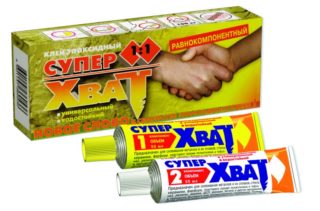 The market price depends on the following determining factors:
The market price depends on the following determining factors:
- adhesive product manufacturer;
- structure;
- performance and purpose.
Among the budget options, an adhesive mixture stands out under the name Spike, which is often used even for gluing metals. It is available in standard tubes packaged in 50 grams and costs only 30 rubles.
For a domestic brand called Super Hvat is characterized by the best value for money. The cost of a universal product is approximately 45 rubles per 100 gram packaging.
Compounds intended for strictly specific purposes will cost the user more. The price of a 300-gram package of glue brand VS-10T costs about 2 thousand rubles, the composition under the name UHU Metall costs an average of 210 rubles per 30-gram package.
The most important criteria when choosing glue
Deciding on the choice of glue will help to consider the following factors:
- purpose - for interior or exterior decoration;
- type of surfaces to be trimmed;
- type of tile material and indicator of thermal expansion;
- ecological purity of the mixture and resistance to moisture;
- the drying speed of the composition and its critical operating temperature.
The adhesive solution for facade cladding, according to the specifications declared by the manufacturer, can withstand temperatures up to 120 degrees. When finishing embossed surfaces, it is recommended to choose a mixture with an appropriate density indicator. Heat-resistant solutions that do not contain toxic components are purchased to meet environmental cleanliness requirements. Moisture-resistant adhesive mixtures are in demand during finishing work in buildings with high levels of humidity or outside the home. When choosing a temperature indicator, not only the upper, but also the lower limit is taken into account.
Popular brands of heat-resistant glue
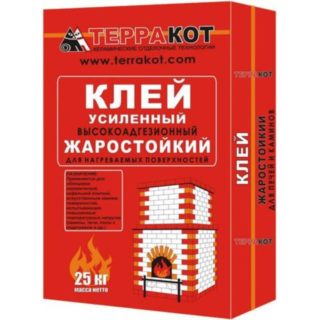 Well-known manufacturers of heat-resistant adhesives for facing stoves and fireplaces offer a large selection of mixtures that differ in their purpose and price. Among the most demanded samples on the market, the following positions stand out:
Well-known manufacturers of heat-resistant adhesives for facing stoves and fireplaces offer a large selection of mixtures that differ in their purpose and price. Among the most demanded samples on the market, the following positions stand out:
- Terracotta is a heat-resistant adhesive (can withstand up to 250 degrees), characterized by good adhesion to the surfaces of any masonry products. It is used in the processing of tiles or natural stones. It costs no more than 500 rubles.
- Clay Profix - a mixture used for arranging and finishing portals, characterized by a high degree of plasticity, due to which it is possible to keep the masonry with a very thin layer. The maximum temperature is 1200, the cost is 455 rubles.
- Scanmix Fire is a high-temperature composition from a Finnish manufacturer, used in the manufacture of fireplaces and stoves, as well as individual chimneys for them. The maximum heating temperature of these compounds is 1200 degrees at a cost of 600 rubles.
The list is completed by Ivsil Termix adhesives designed for durable fireplace mantles. They are characterized by a high level of ductility and are able to withstand heating to a temperature of 250 degrees. The cost of glue from this manufacturer is 460 rubles. This category also includes hot melt adhesives for tiles on the stove under the brand name Ceresit Flex CM 16, designed specifically for laying tile finish on uneven surfaces. The cost of this adhesive sample is 600 rubles.
